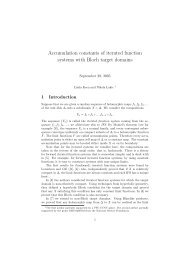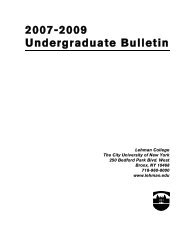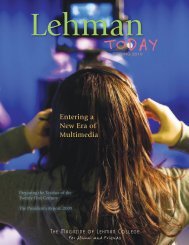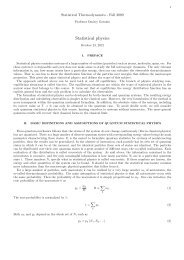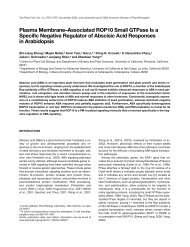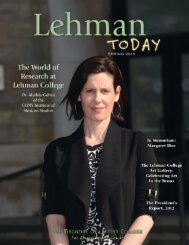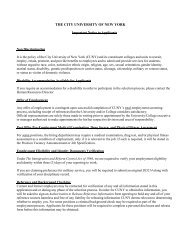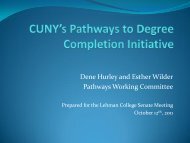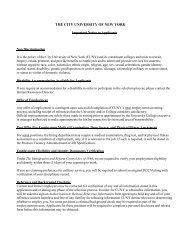Create successful ePaper yourself
Turn your PDF publications into a flip-book with our unique Google optimized e-Paper software.
Shadows<br />
Center for Human Rights<br />
and Peace Studies<br />
Rooted in the History of<br />
The Campus<br />
Hear the Voices of<br />
<strong>Lehman</strong> Students<br />
“This is the hardest thing I’ve ever had to do<br />
in my life. On the outside, you would see a<br />
strong, hard-working, dedicated, and caring<br />
person, but on the inside I have a secret that’s<br />
been tearing me apart every day of my life. Like<br />
many of my fellow Dreamers, I found out at an<br />
early age that I was undocumented and since<br />
then, I’ve always felt like a second-class citizen,<br />
stuck in limbo, without a future and unable to make my dreams come true. But I’ve discovered that I<br />
don’t need a piece of paper to tell me I’m an American. I’m just as American as anyone else.” — Victor<br />
“All my relatives instilled this intense sense of ambition in me to strive for the best. School was the<br />
single most important priority. I was always the smartest boy in class, the golden boy back home despite<br />
the 50 million other cousins I have. And I was expected to do great things with this opportunity.<br />
My mom worked double jobs, my dad worked from 9:00 in the morning to midnight. They brought<br />
me here so I could do what I wanted with my life, without being limited like I probably would have<br />
been back in my country. It wasn’t until high school that I realized, once I was done, I couldn’t really<br />
live up to anyone’s expectations. I couldn’t live up to my own expectations. I just simply couldn’t live.<br />
Where did all my dreams go? Oh, that’s right, they were blocked by a piece of paper, a nine-digit<br />
number.”<br />
— Michael<br />
“We are the students sitting in your classes, the ones you might never suspect, some with thick<br />
accents, others already Americanized. The ones they stamp ‘illegal, banana boats, alien, unwanted,<br />
unneeded, undocumented,’ as if we are not people with the same red hearts and blue veins, as if we,<br />
too, aren’t dreamers. As if we brought ourselves here.<br />
You tell us, ‘Go back to where you come from.’ If only you knew. You aren’t native to this land,<br />
either. Ask for an America without immigrants, and you will have none. No schools. No government.<br />
No buildings. No people. No white men writing declarations because they, too, are immigrants. What<br />
will you do then? With no bricks supporting this nation, your foundation will easily crumble.<br />
We are here studying to make your country a better place as we always have. America, don’t<br />
fool yourself. Don’t break the same backs and bite the same hands that feed you. It isn’t wise. They<br />
stamp us ‘alien, wetback, banana boat, unwanted, unneeded.’<br />
We are undocumented, but we are stepping out of the shadows freely and fearlessly, dreamers<br />
and supporters. Stepping out from the dark, no longer letting our silence and your ignorance be<br />
our defi nitions. Fearlessly and proud, we are telling our stories. This time, you will hear. Listen to our<br />
voices, America—there’s a lot we’ve been wanting to say. We will say it this time.” — Ronesha<br />
In 1946, when the United Nations was<br />
housed on the <strong>Lehman</strong> (Hunter) campus,<br />
Eleanor Roosevelt and her staff<br />
began work on the document that later<br />
would become the Universal Declaration<br />
of Human Rights. Herbert H. <strong>Lehman</strong>,<br />
for whom the <strong>College</strong> is named, was a<br />
prominent internationalist of his day and,<br />
as the fi rst director of UNRRA (U.N.<br />
Relief and Rehabilitation Administration),<br />
led the effort to feed and clothe millions<br />
of refugees after WWII. This legacy has<br />
inspired <strong>Lehman</strong> <strong>College</strong> to maintain an<br />
ongoing connection with the U.N. and<br />
with the issues of both human rights<br />
and peace.<br />
This January, the CUNY Board of<br />
Trustees authorized the establishment<br />
of a new Center for Human Rights and<br />
Peace Studies at the <strong>College</strong>—an idea<br />
that originated in 2006, when <strong>Lehman</strong><br />
cosponsored a global peace conference<br />
in Hiroshima, Japan, where <strong>Lehman</strong> had<br />
operated a campus for several years.<br />
Since then, the Center has held two conferences.<br />
The fi rst, on immigration reform<br />
and immigrants’ rights, identifi ed ways<br />
in which advocacy, coalition-building,<br />
and community outreach can advance<br />
equitable immigration reform and justice<br />
for immigrants. The other conference,<br />
which drew international support and<br />
participation, identifi ed remedies to address<br />
violence against women in Central<br />
America, including feminicide (the killing<br />
of women) at the local and regional level.<br />
Information about the Center’s projects<br />
and events can be found at www.lehman.<br />
edu/human-rights-peace-studies.<br />
<strong>Lehman</strong> Today/<strong>Spring</strong> <strong>2011</strong> 13



